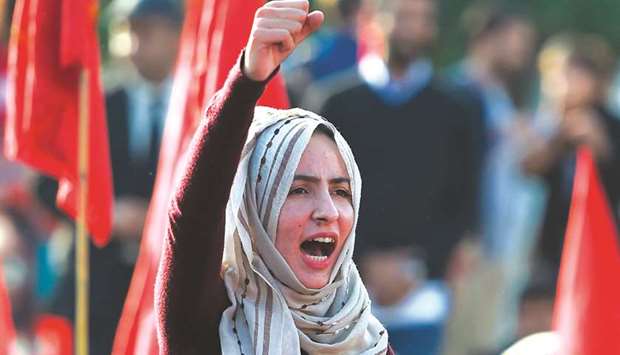There’s never a dull moment in Pakistan. After last week’s pulsating conclusion to the case surrounding the army chief’s extension in Supreme Court, another issue of considerable interest — the restoration of student unions — is generating momentum.
Given the recent uneasy sail, it would seem we’re on the heels of another storm, but it needn’t be so. There is a tendency to view every movement as a sort of threat to national security, if not outright challenge to the status quo. The vibrant youth making themselves heard, in a decidedly democratic expression of their rightful demands in a peaceful way only strengthens the foundation of a just society, not burn the house down. If anything, it only reinforces the ideals of an alive and kicking polity.
The Student Solidarity March, led by the Student Action Committee, came out last Friday in 50 cities across Pakistan to present a charter of demands for the restoration of student unions and better educational facilities. They were joined by teachers, rights activists and members of the civil society, who thronged to the venues to lend support. Many of these mixed marches saw young female students in the vanguard, raising slogans, holding placards and reciting azad nazm (free verse) of legendary poet and author Faiz Ahmed Faiz, to the beat of drums. There was plenty of festive air to the whole campaign — a pleasing sight when compared to the often rough, ultra-political, life-disturbing yet much tolerated sit-ins in the federal capital.
In stark contrast, all participants of the student march dispersed peacefully after a few hours and made light of the exaggerated predictions of a showdown spun by the detractors.
Perhaps, a show of nerves was evident because it has been a long, long time since students made their presence felt. Military ruler General Ziaul Haq, who overthrew the elected government of Zulfikar Ali Bhutto in a bloodless coup in 1977, left a lasting legacy of disenfranchisement and radicalism, one of which was to place a ban on student unions on the pretext of violence on campuses in 1984.
Practically speaking, it has been 35 years since the student unions were in business — barring the brief period when Benazir Bhutto lifted the ban upon assuming charge as Pakistan’s youngest — and Muslim world’s first female — elected prime minister in 1988. She was herself shy of 36 at the time. Poignantly, the next year was the last time elections were held in colleges and universities. Benazir was ousted from power on corruption charges by a hostile president in 1990.
In 1993, the year she returned to power, the Supreme Court prohibited the formation of student unions and called for a proper mechanism for their revival. Unfortunately, successive governments deemed it safe to live in the long shadows of the verdict, treating it little more than a fait accompli.
Bhutto’s own Pakistan People’s Party (PPP) did not live up to the promise of reviving the unions after returning to power yet again in 2008, riding a sympathy wave following her assassination days before the general elections.
A fresh attempt was made in 2017 to address the issue following a motion tabled by PPP senator Rubina Khalid to this effect and taken up by Raza Rabbani, the chairman of the upper house of Pakistan’s bicameral legislature, who, then gave a ruling, calling for their immediate revival. But the PPP was no longer in power, and despite noises in unison, the ruling Pakistan Muslim League-Nawaz government was too busy fighting for survival after losing its prime minister to a court conviction.
Fast forward to the present. The days and weeks of burning midnight oil in corner meetings by office-bearers of the Student Action Committee and solidified with a resonant march last Friday, seem to have paid off with Prime Minister Imran Khan hinting at the possibility of reviving the student unions.
Despite the assurance coming by way of only a tweet, it reflects positively on both the parties — the youth, who felt dejected by this long dark night of denial, and the PM, who, it must be emphasised, owes majorly to the dynamic young voter base which helped him and his party reach the corridors of power. However, it would be erroneous to presume — from a political standpoint — that the revival would benefit only the party in power.
At the same time, it is important to understand the distinction between a student union and a student organisation (or wing of a political/religious party). By its very nature, a union is a more rounded, inclusive entity fighting for and upholding the rights of its members (students, in this case) — for better education, facilities, an environment free of coercion on the campuses (that has been one of the demands placed on record) and harassment issues, to name a few.
Talking of student wings, it is common knowledge that despite the official ban some religious outfits have long had a stranglehold in many college and university campuses through them in trying to drive other students to a certain way of life. So an average student has to contend with both this menace and the challenge itself of attaining his or her education goals for a rewarding career. A revival will hopefully, not only create a more enabling environment but also give way to plurality of views and perhaps, alternative political discourses.
A body of opinion exists, which remains wary of the idea of what it calls “politicising” students, but that may be a rather cynical inference. A society is already ‘political’ if it is alive to its rights, knows how to attain these in a peaceful realm, and responsibilities.
The PM is on message when underlines the need for a code of conduct to groom the youth as future leaders. “We will establish a comprehensive and enforceable code of conduct, learning from the best practices in internationally renowned universities, so that we can restore and enable student unions to play their part in positively grooming our youth as future leaders of the country,” he tweeted.
Time now, for some action.
* The writer is Features Editor. He tweets @kaamyabi

MAKING A STATEMENT: A student rallies fellow participants as they march in the federal capital Islamabad to demand the reinstatement of student unions last Friday.

